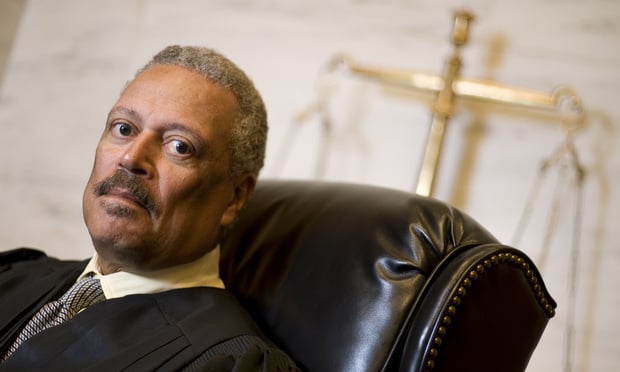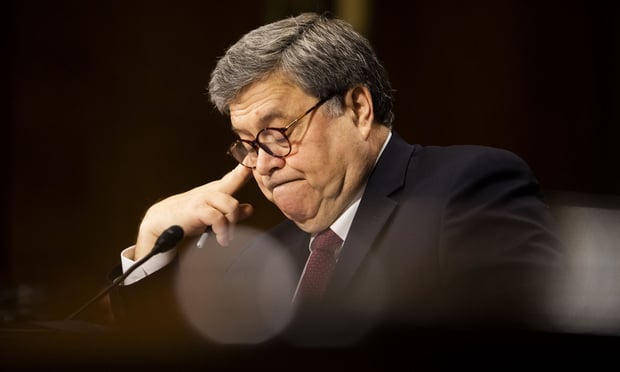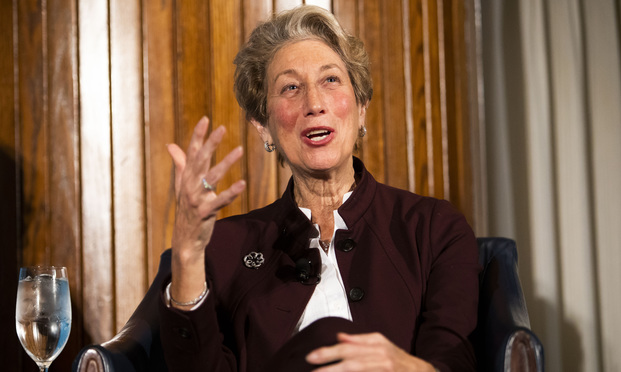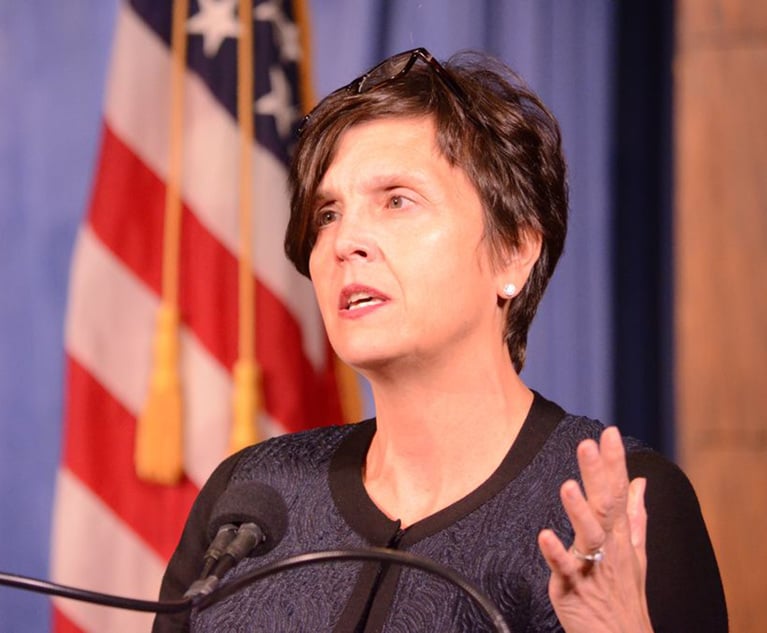Flynn's Lawyers Argue 'No Further Delay' as Judge Opens Door to Barr Criticism
The defense lawyers urged U.S. District Judge Emmet Sullivan to dismiss the case "immediately," telling the court: "No further delay should be tolerated or any further expense caused to him and his defense." Sullivan has opened a door to amicus briefing, as the Barr Justice Department's move has drawn widespread condemnation.
May 12, 2020 at 09:40 PM
9 minute read
 Judge Emmet Sullivan of the U.S. District Court for D.C. Photo by Diego M. Radzinschi/ NLJ
Judge Emmet Sullivan of the U.S. District Court for D.C. Photo by Diego M. Radzinschi/ NLJ
Lawyers for Michael Flynn asked a federal judge Tuesday to reject any efforts by outsiders to file briefs confronting the Justice Department's move to dismiss the prosecution of the former Trump national security adviser, who twice pleaded guilty to lying to investigators about his past communications with the Russian ambassador to the U.S.
In a court filing, Flynn's defense lawyers said a group calling itself the "Watergate Prosecutors" had notified U.S. District Judge Emmet Sullivan on Monday that it wanted to file a friend-of-the-court brief following the Justice Department's abandonment of the prosecution.
Amicus briefs are rarely filed in the federal trial courts, but Sullivan earlier Tuesday indicated he would allow them in the Flynn prosecution, one of the most closely watched cases in the Washington court. Sullivan said in an order he'd set a briefing schedule for the filing of any briefs, a move that effectively would slow down the Justice Department's move to drop the case.
"No rule allows the filing, and the self-proclaimed collection of 'Watergate Prosecutors' has no cognizable special interest. Separation of powers forecloses their appearance here. Only the Department of Justice and the defense can be heard," Flynn's defense team wrote in their court filing Tuesday.
The defense lawyers said "the Watergate Prosecutors' attempted filing itself should not be registered on the docket, and any attempt by the group or any individual to make a filing in this case must be denied—as all others have been." The defense lawyers urged Sullivan to dismiss the case "immediately," telling the judge: "No further delay should be tolerated or any further expense caused to him and his defense."
Zuckerman Taylor partner William Taylor III and Lawrence Robbins of Washington's Robbins, Russell, Englert, Orseck, Untereiner & Sauber represented the former Watergate prosecutors as the proposed amicus parties.
"The integrity of prosecutorial decision making is a cornerstone of the rule of law. Amici have a special interest in restoring the public trust in prosecutorial decision making and in public confidence in the viability of future independent investigations and prosecutions if the results of such work are likely to be subjected to reversal by transparent political influence," Taylor and Robbins wrote in a statement of interest.
Sullivan's order Tuesday evening recognized that amicus briefs are rare at the trial level. Quoting one of his colleagues, U.S. District Judge Amy Berman Jackson, who has presided over separate prosecutions brought by former Special Counsel Robert Mueller III, Sullivan said, "while there may be individuals with an interest in this matter, a criminal proceeding is not a free for all."
Flynn pleaded guilty in December 2017 to lying to federal agents about his communications with Russia's top diplomat to the United States ahead of Trump's inauguration. At a court hearing, Flynn said, "I recognize that the actions I acknowledged in court today were wrong, and through my faith in God, I am working to set things right." He later fired his lawyers at Covington & Burling and has since moved to withdraw his guilty plea. That effort is pending.
 Attorney General William Barr testifies on Wednesday, May 1, 2019. Credit: Diego M. Radzinschi / ALM
Attorney General William Barr testifies on Wednesday, May 1, 2019. Credit: Diego M. Radzinschi / ALMThe move to dismiss Flynn's case was seen widely as the latest instance of the Trump-era Justice Department's leadership intervening in a prosecution to benefit an ally of the president. Just months ago, U.S. Attorney General William Barr and other Justice Department leaders stepped into the sentencing of Roger Stone to recommend a shorter prison term than what career prosecutors had recommended for the longtime Trump confidant.
"In both cases, the department undercut the work of career employees to protect an ally of the president, an abdication of the commitment to equal justice under the law," former federal prosecutor Jonathan Kravis, who resigned after Barr intervened into the Stone case, said in an op-ed Monday at The Washington Post. "Prosecutors must make decisions based on facts and law, not on the defendant's political connections. When the department takes steps that it would never take in any other case to protect an ally of the president, it betrays this principle."
Barr has defended his move to dismiss the Flynn prosecution, which conservatives and Trump allies have called an example of prosecution overreach. Barr, speaking with CBS News last week, called the case an "injustice."
Flynn's reprieve came amid a review of his prosecution by Jeffrey Jensen, the top federal prosecutor in St. Louis, whom Barr tasked with scrutinizing the case. Jensen's review uncovered internal FBI records that Flynn and Trump allies seized on to claim he had been set up by agents. Sullivan last year had rejected that allegation, saying there was no "ambush" by the FBI.
The Justice Department moved to dismiss Flynn's prosecution on the assertion, contested by other former DOJ leaders, that the FBI never had a basis to interview Flynn in the first place. In the motion to dismiss—signed only by Timothy Shea, a former Barr aide who was named the U.S. attorney in Washington earlier this year—the Justice Department said it was not convinced there was a "legitimate investigative basis" for the January 2017 interview at the core of the false statements case against Flynn.
Beyond Sullivan's order Tuesday inviting amicus briefs, the judge has not said anything about the next steps in the Flynn case.
Questions about how Sullivan might respond to the move to dismiss Flynn's case have been the subject of widespread speculation in recent days. Nearly 2,000 former Justice Department officials on Monday called for Sullivan to reject the motion to dismiss and proceed with Flynn's sentencing.
In a Washington Post op-ed, three former high-ranking Justice Department officials, including Debevoise & Plimpton partner David O'Neil, said Flynn's guilt "has already been adjudicated."
"So if the court finds dismissal would result in a miscarriage of justice, it can deny the motion, refuse to permit withdrawal of the guilty plea and proceed to sentencing," O'Neil wrote, in an op-ed co-authored by John Gleeson, a former federal judge, and Marshall Miller, a former chief of the criminal division in the U.S. attorney's office in Brooklyn.
Sullivan has a reputation for being unbashful in dispensing criticism of lawyers appearing before him. "You are only right by coincidence if you predict what Judge Sullivan is going to do," one lawyer said. Still, Sullivan is widely expected to not simply rubber-stamp the Justice Department's motion to dismiss the Flynn case.
In interviews, former prosecutors and other lawyers said Sullivan has an array of options as the next stage of Flynn's case unfolds. Sullivan could decline to dismiss Flynn's case, reject his bid to withdraw his guilty plea and proceed toward sentencing. Any such move could tee up a pardon from Trump, who hailed the Justice Department's move to drop the case after criticizing Flynn's prosecution as a "scam."
 Shira Scheindlin, former federal judge. Credit: ALM
Shira Scheindlin, former federal judge. Credit: ALM"He is convicted on his plea, because the court had not yet ruled on withdrawing the plea. It's really in the judge's hands, not the prosecutors' hands," said Shira Scheindlin, a former judge in the U.S. District Court for the Southern District of New York who is now of counsel at Stroock & Stroock & Lavan.
Sullivan could also grant the Justice Department's motion to dismiss—but not to the extent it requested. In the Justice Department's court filing, Shea asked the judge to dismiss the case "with prejudice," meaning that prosecutors could not revisit Flynn's conduct and consider prosecuting him anew. If Sullivan instead dismissed the case "without prejudice," federal prosecutors would not be foreclosed from reviving a case over Flynn's admitted misconduct.
Still others said Sullivan could also appoint an independent counsel to weigh the Justice Department's arguments.
"It could be limited to give [the judge] the legal arguments about why, given the record here, the government's position is wrong, or simply make recommendations to the court about what the court could do," said Kelly Currie, a partner at Crowell & Moring and former federal prosecutor in Brooklyn.
Any appointment of a special counsel would not be without precedent. Sullivan appointed an independent counsel to review the conduct of prosecutors who led the case against the late Alaska Sen. Ted Stevens, charged in public corruption case in Washington in 2008.
More than a decade ago, Sullivan picked former federal prosecutor Henry F. Schuelke, now a senior counsel at Blank Rome, to review the Justice Department's conduct in the case against Stevens, accused of lying on financial disclosure forms by failing to report a gift of home remodeling from an oil-field services company.
The Justice Department's case was marred by findings that prosecutors withheld exculpatory evidence from Stevens, represented by a team from Williams & Connolly, including Brendan Sullivan Jr. Then-U.S. Attorney General Eric Holder Jr. asked Sullivan to dismiss the case against Stevens.
"The point is Sullivan doesn't seem to be a judge who wouldn't think outside the traditional box. That could be something he'd do here," Currie said. He added: "Judge Sullivan seems to have a record of thinking independently and is not hesitant to call the government to task when he feels it's appropriate."
Read more:
Thousands of Ex-Prosecutors Urge Flynn Judge to Question Barr's Move to Drop Case
Covington Clashes With Michael Flynn's Lawyers Over Records Search
'A Pardon by Another Name': Lawyers Decry Barr's Move to Dump Flynn Case
'When Character Matters Most': Lawyers Defend Stone Prosecutors Who Quit
Who Is Jeff Jensen, Ex-Husch Blackwell Partner and Barr's Point Person on Flynn Case?
'The Record Proves Otherwise': Judge Knocks Down Mike Flynn's 'Ambush' Claims
This content has been archived. It is available through our partners, LexisNexis® and Bloomberg Law.
To view this content, please continue to their sites.
Not a Lexis Subscriber?
Subscribe Now
Not a Bloomberg Law Subscriber?
Subscribe Now
NOT FOR REPRINT
© 2025 ALM Global, LLC, All Rights Reserved. Request academic re-use from www.copyright.com. All other uses, submit a request to [email protected]. For more information visit Asset & Logo Licensing.
You Might Like
View All
Skadden and Steptoe, Defending Amex GBT, Blasts Biden DOJ's Antitrust Lawsuit Over Merger Proposal
4 minute read
'Lack of Independence' or 'Tethered to the Law'? Witnesses Speak on Bondi
4 minute read
Law Firms Mentioned
Trending Stories
Who Got The Work
J. Brugh Lower of Gibbons has entered an appearance for industrial equipment supplier Devco Corporation in a pending trademark infringement lawsuit. The suit, accusing the defendant of selling knock-off Graco products, was filed Dec. 18 in New Jersey District Court by Rivkin Radler on behalf of Graco Inc. and Graco Minnesota. The case, assigned to U.S. District Judge Zahid N. Quraishi, is 3:24-cv-11294, Graco Inc. et al v. Devco Corporation.
Who Got The Work
Rebecca Maller-Stein and Kent A. Yalowitz of Arnold & Porter Kaye Scholer have entered their appearances for Hanaco Venture Capital and its executives, Lior Prosor and David Frankel, in a pending securities lawsuit. The action, filed on Dec. 24 in New York Southern District Court by Zell, Aron & Co. on behalf of Goldeneye Advisors, accuses the defendants of negligently and fraudulently managing the plaintiff's $1 million investment. The case, assigned to U.S. District Judge Vernon S. Broderick, is 1:24-cv-09918, Goldeneye Advisors, LLC v. Hanaco Venture Capital, Ltd. et al.
Who Got The Work
Attorneys from A&O Shearman has stepped in as defense counsel for Toronto-Dominion Bank and other defendants in a pending securities class action. The suit, filed Dec. 11 in New York Southern District Court by Bleichmar Fonti & Auld, accuses the defendants of concealing the bank's 'pervasive' deficiencies in regards to its compliance with the Bank Secrecy Act and the quality of its anti-money laundering controls. The case, assigned to U.S. District Judge Arun Subramanian, is 1:24-cv-09445, Gonzalez v. The Toronto-Dominion Bank et al.
Who Got The Work
Crown Castle International, a Pennsylvania company providing shared communications infrastructure, has turned to Luke D. Wolf of Gordon Rees Scully Mansukhani to fend off a pending breach-of-contract lawsuit. The court action, filed Nov. 25 in Michigan Eastern District Court by Hooper Hathaway PC on behalf of The Town Residences LLC, accuses Crown Castle of failing to transfer approximately $30,000 in utility payments from T-Mobile in breach of a roof-top lease and assignment agreement. The case, assigned to U.S. District Judge Susan K. Declercq, is 2:24-cv-13131, The Town Residences LLC v. T-Mobile US, Inc. et al.
Who Got The Work
Wilfred P. Coronato and Daniel M. Schwartz of McCarter & English have stepped in as defense counsel to Electrolux Home Products Inc. in a pending product liability lawsuit. The court action, filed Nov. 26 in New York Eastern District Court by Poulos Lopiccolo PC and Nagel Rice LLP on behalf of David Stern, alleges that the defendant's refrigerators’ drawers and shelving repeatedly break and fall apart within months after purchase. The case, assigned to U.S. District Judge Joan M. Azrack, is 2:24-cv-08204, Stern v. Electrolux Home Products, Inc.
Featured Firms
Law Offices of Gary Martin Hays & Associates, P.C.
(470) 294-1674
Law Offices of Mark E. Salomone
(857) 444-6468
Smith & Hassler
(713) 739-1250











